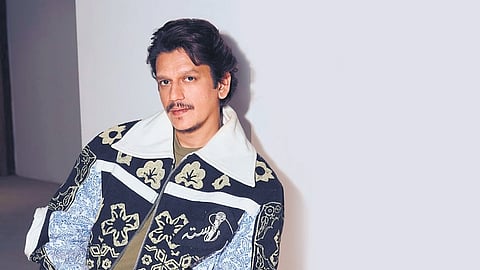‘Couldn’t have planned this,’ says Vijay Varma
Your latest show IC814: The Kandahar Hijack, which is based on Captain Devi Sharan’s memoir Flight into Fear: The Captain Story has been garnering praise for its realistic and riveting narrative of what happened on the Air India flight in December 1999. You play Captain Sharan. What was it like to recreate his resilience?
My work initially was to get myself ready for the cockpit. I did the preparatory work of learning a bit about the aircraft in the flight simulation, as well as meeting up with Captain Sharan to hear his version of what happened during that fateful week. But, the real challenge began when we started filming because I realised whatever I could perform was in one direction with three cameras constantly capturing my expressions and emotions. I tried to be as authentic as I could be since I was restricted to a chair, looking in one direction, but still having these conversations with people all around me. This came with a lot of trial and error.
During your chats with Captain Sharan, what was that one aspect of his personality you felt could be your point of entry into his world?
He has tremendous stability as an individual, which was crucial in manoeuvring the crisis. It was his patience, calm bent of mind and clarity of thought that held the aircraft and all the passengers together. These personality traits enabled him to have a certain command over the hijackers. He also has a very effective smile, which he made use of efficiently. Sometimes, you know, because you are locked up in this one aircraft for over eight days with these people, and some of them have a gun pointed at you, you have to reach out to their humane side. He shared instances where all the people on board eventually became okay with each other, including the hijackers. What was amazing is after the rescue, Captain Sharan was back on his flight schedule. It was perhaps his way of dealing with the trauma. I realised this man was way bigger than the situation, and that was my cue.
What was it like collaborating with director Anubhav Sinha? You had also shared how being on the same credit roll as Naseerudin Shah and Pankaj Kapur was a proud moment for you.
Anubhav disarmed me with his charm and wit. I figured he did not like the idea of the director-actor relationship. He enjoys being a friend, who is open to suggestions. Though I don’t have any scenes with Pankaj Sir and Naseer Saab, I just can’t get over the fact that there is a poster with my face alongside theirs. They are such powerful actors, who have been a reference point for my generation of actors.
You too have managed to create your own space—from She to Darlings, Mirzapur and Murder Mubarak. Has it become easier for you to navigate the film industry now?
This is something that I could not have planned. A lot of people who have given up on so-called Bollywood say that they watch my stuff because it is something new and original, which is motivating. Although I was never happy with the Bollywood tag—the name itself is derivative—what I am doing is also kind of Bollywood. The industry is easy to navigate, as long as you know what you want. You need a thinking brain, head on your shoulders and feet on the ground. After I started working actively, I realised people want to work with those actors who are adding to their life between action and cut.
Your next, Matka King, is a period crime series, set against the backdrop of the matka gambling phenomenon of the 1960s. Tell us more.
It is a dream collaboration for me. I have been a great admirer of Nagraj Manjule’s work. He is a potent filmmaker, and I felt he could challenge me in the best possible way. We are currently shooting, and I am in love with the 60s’ fashion, the bell bottoms, the kitsch haircut, and all that jazz.

